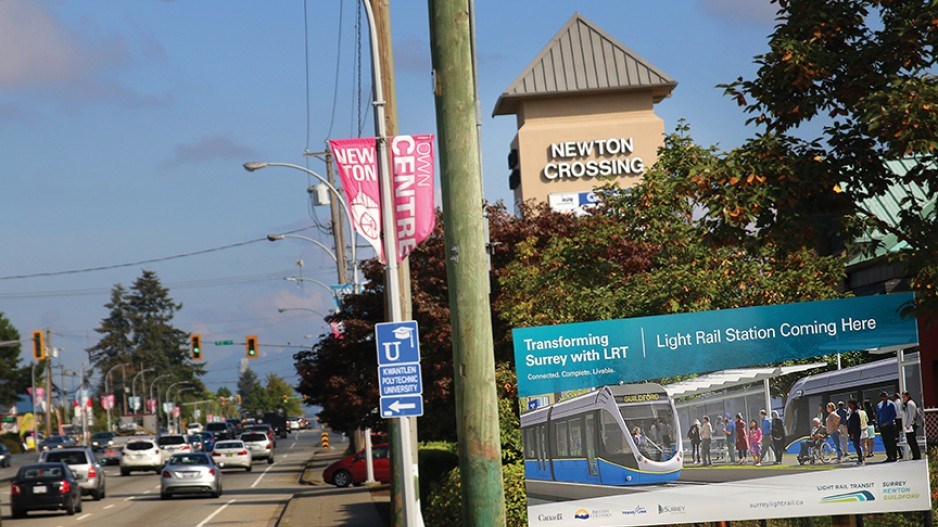Hope for affordable housing along Surrey’s new light-rail transit (LRT) line route has collided with land banking and speculation that have driven residential land prices up 100% in the past two years.
Surrey is often seen as a bastion of affordable Metro Vancouver homes. In August approximately 200 detached houses were listed for sale in Surrey for $1 million or less, for instance, compared with just one in Vancouver. The typical Surrey condo apartment sells for $340,000 compared with $846,100 in Greater Vancouver, according to data from the Fraser Valley Real Estate Board.
Surrey is also the fastest-growing metro centre in B.C., and its young population – 22% of B.C. births are now in Surrey – is gunning to claim the title as the province’s biggest city within a generation.
The population gap between Surrey and Vancouver will be non-existent by 2040, according to a report by Michael Heeney, president and CEO of the Surrey City Development Corp. (SCDC), presented September 13 in an event sponsored by the Real Estate Institute of British Columbia.
“Surrey is the future,” said Surrey developer Charan Sethi, president of Tien Sher, which has built and sold out half a dozen low-rise condominium projects in and around Surrey Centre. Sethi is now pulling together plans and permits for the redevelopment of the former Flamingo hotel site in North Surrey into Tien Sher’s first highrise residential project.
That future, however, hinges in large part on young families being able to find homes they can afford.
This month, Prime Minister Justin Trudeau visited Surrey to confirm federal funding for the Surrey-Newton-Guildford light-rail transit project. The $1.65 billion line will run 10.5 kilometres along King George Highway and 104th Street to link Newton with the Surrey Central transit station.
The LRT has created a development buzz in Newton because of the higher-density residential zoning allowed.
Surrey’s Newton Town Centre plan calls for the rezoning of aging commercial strips and housing lots into a 2.5 floor space ratio (FSR) for five-to-six-storey residential buildings and 3.5 FSR for highrise residential towers. (The floor space ratio equates to the amount of square feet of housing that can be built. A 10,000-square-foot lot at a 2.5 FSR, for instance, would relate to a potential 25,000 square feet of sellable space.)
The cost of an acre of residential land in Surrey hit $3.1 million this year, according to Colliers International, up from $2 million in 2016. Along the LRT route, however, prices have soared to $4 million to $5 million per acre, according to Joe Varing, director of sales for the Varing Marketing Group, which specializes in Fraser Valley land deals for residential development.
“Prices are double what they were in 2016,” he said.
Varing noted that Surrey had emphasized affordable housing along the LRT route, but the higher-density zoning makes no accommodation for rental housing.
It is up to developers to decide whether they build rentals or condominiums, he explained. Surrey has a requirement that all new rezonings for residential developments must contribute $1,000 per unit to “support new affordable rental housing,” but details are unclear on where and how the rental housing would be built.
The high LRT route land prices are deterring even condo builders, who say the gravy train has already left the station.
“I plead with everyone, ‘Find me two to five acres in Newton,’” Sethi said, but he suggested land speculation over the past two years has driven the price too high for most multi-family developers.




